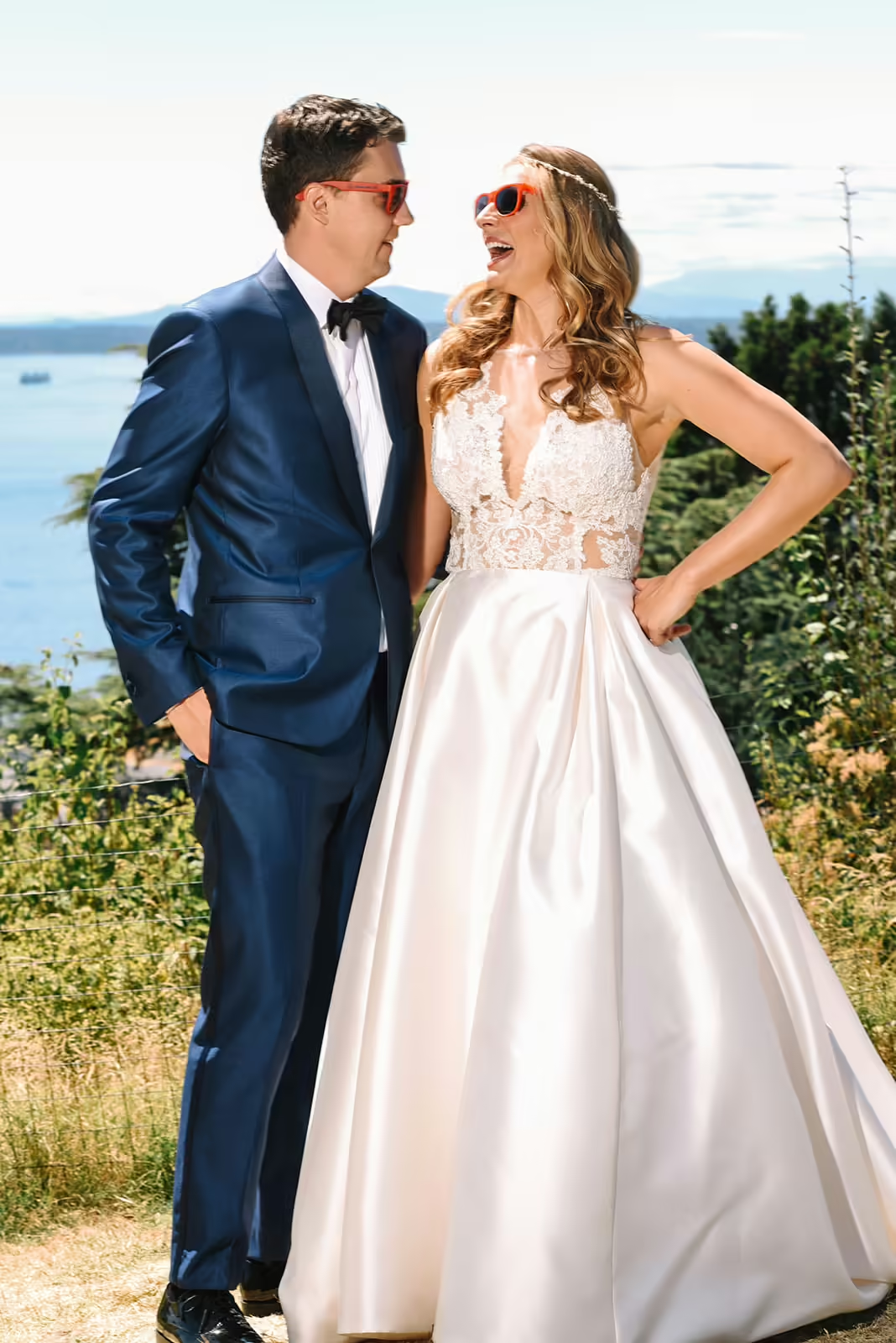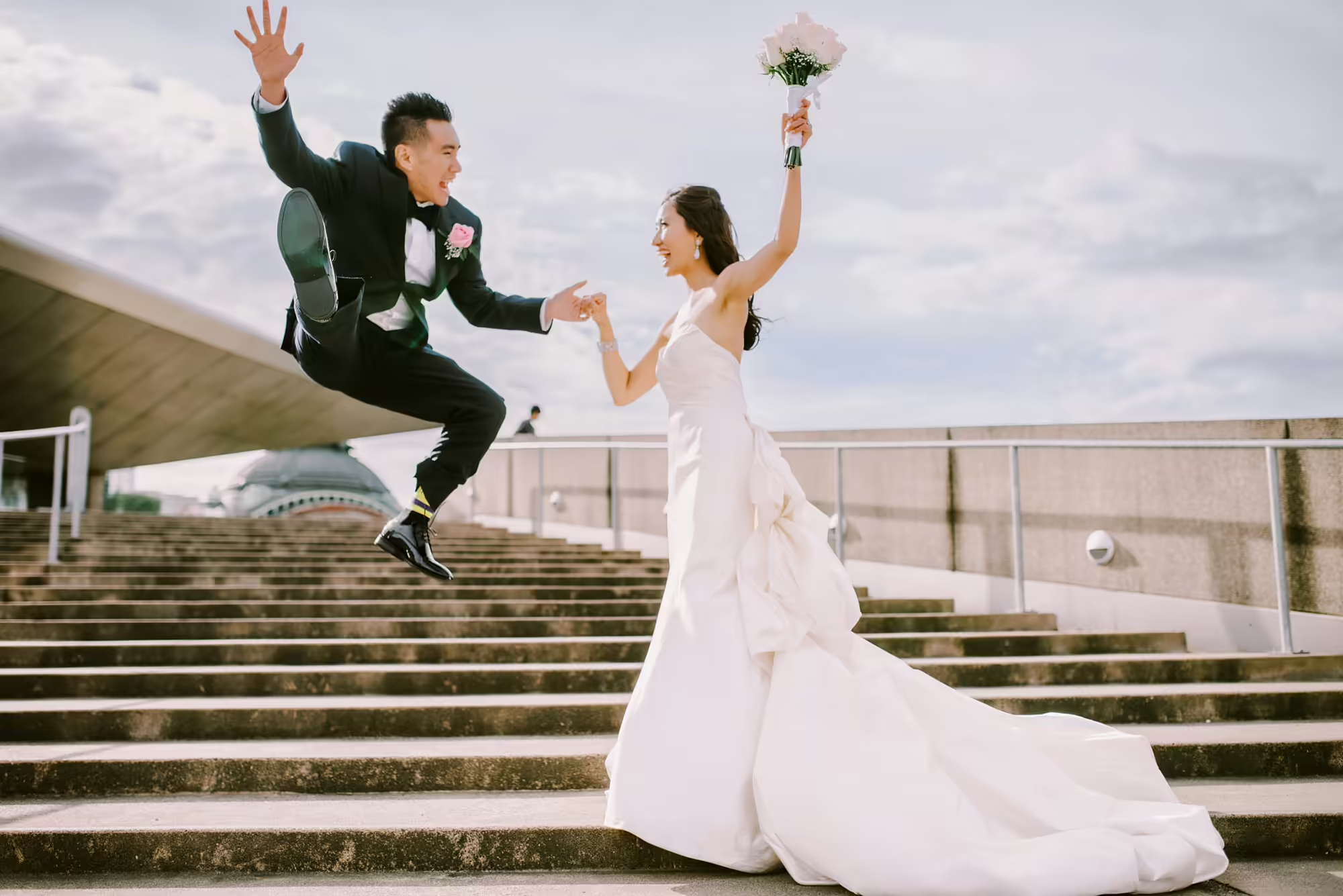How to Hire a Wedding Photographer You’ll Love
READ TIME: 5-6 minutes
Congratulations on your engagement! Now begins the exciting yet somewhat arduous journey of planning your wedding.
One of the top priorities is hiring your wedding photographer.
Here’s a checklist you can keep in mind when starting to think about hiring your wedding photographer.
Know Your Terms, Know Your Vibe
Be familiar with the words used when talking about photography.
Words like “editorial”, “documentary” or “commercial” get bandied around, which mean very different things to photographers than it does to our clients. Knowing these terms will help you communicate your vision better.
Editorial/Portraits: These are posed photos, which requires planning and direction. The photographer controls the setting, the poses and the expressions of its subjects.
The Portraits portion of your wedding photography contains scheduled First looks (also called reveals, where the couple sees each other for the first time before the ceremony), bridals or groomals (which are portraits of the couple).
Engagement sessions are also posed portraits with some in-between candids. Even if some portraits look like they’re natural and show the couple interacting, they are largely prompted to inspire candidness. It’s a common misconception that these situations happen organically – they sometimes do, but not always. Because most people are nervous in front of a camera, we often have to plan our sessions and prompt for a time-efficient, smooth and fun experience.
A skilled portrait photographer helps you feel comfortable in front of a camera, drawing out moments that make the photos uniquely yours.
Reportage/Documentary/Photojournalism:
These photos are unscripted and often work together in a group that tells a story. These are the “in-between” photos you’re looking for. JTPA is known for our strength in reportage.
Documentary photos are compositionally thoughtful. We wait for these moments and are intentional with layering and timing. They will often be emotional with lots of fun scenes upon which to look back, bringing your big day back in unexpected ways.
Finally, get a handle on your vibe, what you like and even what you don’t. We know it’s overwhelming to see what’s out there, but as the kids say these days, IYKYK. Don’t just go with what’s on trend but what you instinctively get in your gut is YOU and your partner. If you’re low key and casual, find someone who’s also low key and knows how to go with the flow. If you’re extra and glam, go with someone who knows how to match that.
Book Early
Wedding photography is subjective and personal. While there are many of us in the market, finding and hiring a wedding photographer that fits your needs can be a long, drawn-out process.
It’s wise to shop and hire your wedding photographer as soon as you secure your wedding venue.
The other advantage of shopping early is a flexible payment schedule so you can afford the photographer you love.
Most photographers ask for a 50% non-refundable date-reservation fee to book, with the remainder due a month or a few weeks before your wedding. That’s still a good chunk of cash to drop, so if you shop early enough, you may ask for a less intense payment schedule.
Ask to See Full Galleries
To appreciate good wedding photography, ask to see the wedding photographer’s most recent work in full galleries. These are galleries of past weddings they’ve delivered to their existing clients.
With the internet and digital media these days, this is pretty standard.
Ask for a full wedding gallery of a wedding shot in a similar setting.
While the photographer doesn’t have to have shot at your exact venue, a similar setting with similar lighting conditions will suffice. Of course it’s best if they are familiar with the venue, but any professional wedding photographer should be able to adapt easily.
Gear and Insurance
Some wedding blogs will advise on asking what type of cameras, lenses and lights we use. I am a gear nerd, so I love geeking out on hardware. However, in all honesty, our cameras have little to do with the results, other than the practical aspect of having enough backup to make sure we don’t run into problems when shooting on-location.
Every wedding photographer should at least have two camera bodies, 4-5 lenses depending on what’s needed, 2-3 lights and accessories.
More importantly, we have a lot of redundancy and backup. We also have insurance to cover any malfunctions or accidents, including liability. Weddings are packed with people and activity, so anything can happen. A professional wedding photographer will have many scenarios covered gear-wise, insurance-wise and backup-wise.
Check out their Reviews!
These days, every pro in every business can be reviewed. Google their business reviews and find them on services like Yelp, Wedding Wire, The Knot and more. Ask vendors you’ve already hired what they think (especially your wedding planner).
Communication Etiquette
With the caveat that weekends are usually a busy time for us wedding photographers and that we also have office hours of usually 9am to 5pm Tuesdays to Fridays (my studio takes Mondays off), timely communication is key to making sure you’ve hired a pro.
I’d say responding to any urgent questions within 24 hours is reasonable, or non-urgent ones within 48. Texting being a main way of communicating these days may work with some photographers – ask if this is okay.
All key concerns/requests need to be settled BEFORE your big day so NO urgent communication apart from emergencies (such as injury, extreme weather, major change in timeline or locations) is necessary. You want to be able to leave everything to your wedding team the day of.
Post Production Style and Speed

Trends and vibes may be important in the design of your wedding but the editing of your wedding photos should be timeless. Having been in this business since 2007, we’ve seen many trends come and go, sometimes within the same wedding year. Remember “sepia bride” from 2024? Tastes change quickly and you may like a certain edit when you got engaged, which can become old by the time your wedding rolls around a year later.
Go with timeless and clean, ALWAYS, in post production or in the way photos are shot for your wedding. You can be trendy with other photos in your life anytime you like!
When it comes to turnaround times, check your contracts. 6-8 weeks is the average, and some photographers offer a sneak preview of a handful of photos 24-48 hours after your wedding. If this is important to you, ask! It shouldn’t be a dealbreaker though, because you want to make sure your photographer is giving your wedding photos the time and attention they deserve.
Connection & Passion
Finally, a professional photographer is passionate about their craft, and most want to connect with their clients. We will share our personal lives on our Instagram stories, educate, show BTS clips. And most of all, take the time to meet you on Zoom at the very least as “first contact”. This is where we find out if we vibe as friends. This is important because wedding photography, like portrait photography, works best when we connect well. This is a profession that requires empathy and emotional intelligence if we are to do it well!
Ready to hire a wedding photographer?
Schedule your no-obligation consult with us today and put all these tips to test! I look forward to sharing my vision with you!
Need wardrobe inspiration? Check out our Pinterest board on what to wear to your JT&Co shoot!


